Discovering Mindfulness in Everyday Life
What Is Mindfulness?
Mindfulness is the practice of focusing your full attention on the present moment with openness and without judgment. It involves being consciously aware of your thoughts, feelings, bodily sensations, and surroundings as they unfold. This practice encourages acceptance and curiosity rather than criticism or avoidance.
Benefits for Mental and Physical Health
Incorporating mindfulness into daily life can significantly improve both mental and physical well-being. Mindfulness has been shown to reduce stress, anxiety, and symptoms of depression by helping people manage their thoughts and emotions more effectively. It also promotes emotional regulation, resilience, and self-compassion.
Physically, mindfulness supports overall health by lowering blood pressure, improving sleep quality, decreasing chronic pain, and reducing inflammation. Many studies report that consistent mindfulness practice can enhance immune function and lessen symptoms related to chronic conditions.
Making Mindfulness Accessible
Mindfulness is a practical, flexible approach that can easily fit into everyday routines without needing extensive time or special equipment. Simple activities such as mindful breathing, paying attention to the sensations while eating, or engaging fully in daily tasks like walking or washing dishes help cultivate presence.
Taking even a few minutes each day to practice mindfulness can create noticeable benefits. Guided apps, online resources, or local mindfulness courses can offer additional support. The practice is adaptable for all ages and can be integrated into work, school, and home environments to promote sustained mental and emotional health.
Understanding Mindfulness: The Basics and Benefits
What is Mindfulness?
Mindfulness is the practice of paying deliberate attention to the present moment with an open, nonjudgmental awareness of thoughts, feelings, bodily sensations, and the environment. Rooted in ancient meditation traditions, mindfulness invites us to consciously engage with our current experience rather than react habitually to thoughts or emotions (Mindfulness definition and principles, Mindfulness definition).
How Does Mindfulness Benefit Mental Health?
Practicing mindfulness consistently has been shown to reduce stress, anxiety, and symptoms of depression. It fosters emotional regulation by helping individuals observe their thoughts and feelings without getting overwhelmed or caught in negative patterns. This heightened awareness encourages greater self-compassion and resilience, enabling people to manage worries about the past or future with more ease (Mindfulness practice and mental health, Mindfulness and emotional regulation, Mindfulness and emotional regulation).
What Are the Physical Health Benefits of Mindfulness?
Mindfulness supports physical well-being by helping to lower blood pressure, improve sleep quality, and strengthen immune function. By reducing cortisol and calming the nervous system, mindfulness practices promote relaxation and reduce the body’s stress response. These benefits contribute to better management of chronic conditions and overall health improvement (Mindfulness for Your Health, The Power of Mindfulness, Benefits of Mindfulness).
Integrating mindfulness into daily routines through simple exercises like mindful breathing, body scans, or mindful eating can promote lasting mental and physical well-being without requiring extensive time or special equipment (Incorporating mindfulness into daily routines, Mindfulness Practices).
Simple Mindfulness Techniques for Daily Integration
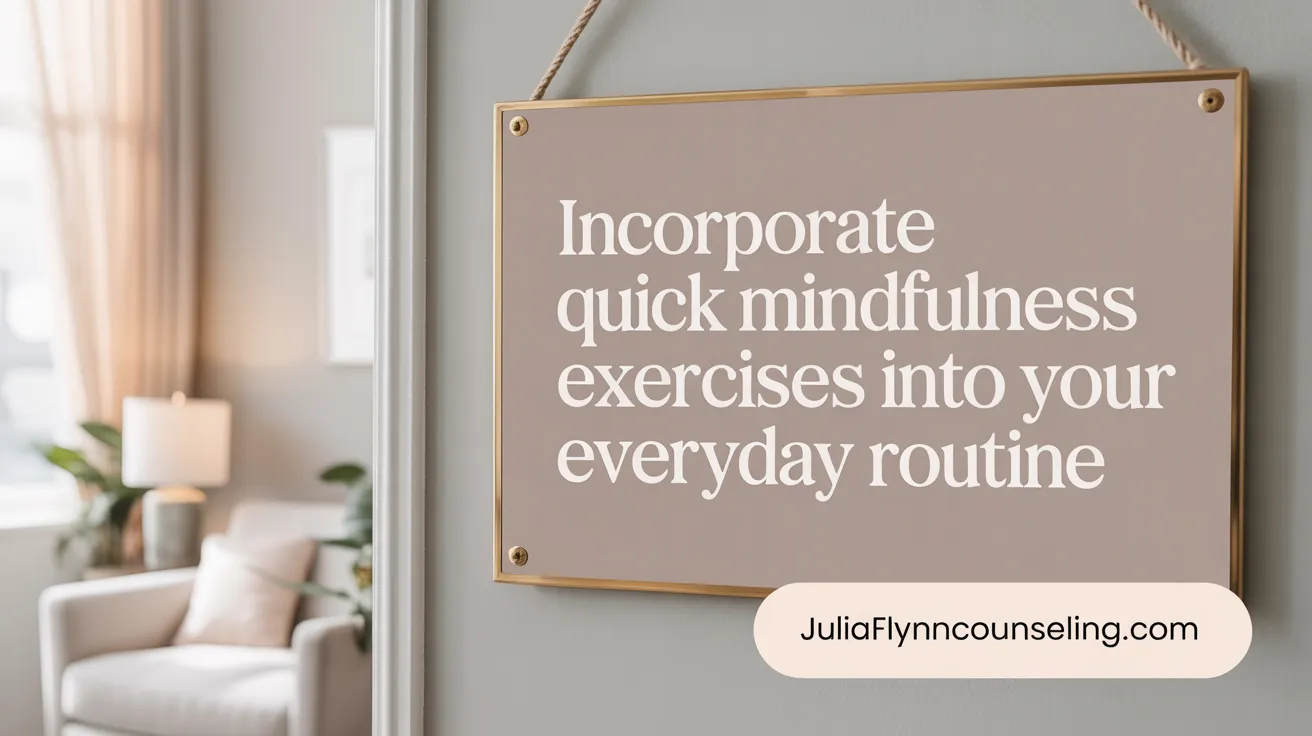
What are mindful breathing methods?
Mindful breathing involves paying close attention to your breath to help regulate physical and emotional responses. Popular techniques include:
- Deep breathing: Slowly inhale deeply through the nose, filling your lungs, then exhale slowly through the mouth.
- 4-7-8 breathing: Inhale quietly through your nose for 4 seconds, hold for 7 seconds, and exhale slowly through the mouth for 8 seconds.
- Observational breathing: Simply observe your natural breathing pattern without trying to change it; notice the sensation of air entering and leaving.
These breathing exercises can be done anytime to reduce stress, improve focus, and support relaxation. For more on Mindful Breathing Techniques and the 4-7-8 breathing method, see these resources.
How does body scan meditation work?
Body scan meditation involves systematically focusing attention on different parts of your body, from head to toe. By noticing sensations such as tension, warmth, or relaxation without judgment, this practice fosters increased bodily awareness and emotional regulation. It can be done in just a few minutes and helps you reconnect with physical sensations, reduce anxiety, and promote calm. Learn more about Body Scan Meditation Practice and Body Scan Mindfulness.
What are the benefits of mindful eating and walking?
Mindful eating encourages fully experiencing the taste, smell, texture, and sensation of food while eating slowly without distractions. This practice supports better digestion, prevents overeating, and enhances appreciation of meals.
Mindful walking involves paying attention to the movement of each step, the feeling of your feet on the ground, and your surroundings. It helps ground you in the present moment, improves bodily awareness, and can gently reduce stress and enhance mood. Explore Mindful Eating Habits and Mindful Walking Practices for more guidance.
How can journaling and gratitude reflection enhance mindfulness?
Journaling allows you to record your thoughts and emotions, aiding in processing feelings and self-reflection. Gratitude reflection—writing or thinking about things you are thankful for—can increase positive emotions and foster a mindset of acceptance and contentment.
Incorporating these simple mindfulness techniques throughout your day can improve mental well-being, reduce anxiety and stress, and cultivate a more compassionate relationship with yourself. Check out resources on Journaling for Mental Health and Gratitude Journaling.
Mindfulness in Routine Activities: Turning Chores into Wellness Moments
Practicing mindfulness during chores like washing dishes and laundry
Engaging in everyday chores such as washing dishes or doing laundry can transform these tasks into meaningful mindful moments in daily routines. By intentionally focusing attention on each moment—whether noticing the warmth of the water, the texture of soap suds, or the sounds of moving clothes—individuals cultivate presence and reduce distraction.
Sensory awareness to enhance presence
Heightening sensory awareness during chores deepens mindful engagement. Observing the colors, smells, and tactile sensations anchors attention in the here and now, fostering calmness. Mindfulness encourages nonjudgmental noticing, allowing thoughts and worries to pass without reaction while embracing the sensory experience fully (Mindfulness exercises for adults).
Behavioral activation benefits from routine tasks
Routine activities act as behavioral activation, which supports mental health by providing structure and purposeful engagement. Performing chores mindfully can decrease anxiety and depression symptoms, enhance mood, and promote a sense of accomplishment (mindful moments in daily routines). This enhanced interaction with daily tasks helps break cycles of rumination and inactivity.
Emotional regulation through mindful engagement
Mindful involvement in chores supports emotional regulation by shifting focus away from distressing thoughts to the sensory present moment. This practice reduces stress levels and fosters mental resilience (Mindfulness and emotional regulation). The ongoing attention and acceptance allow emotions to be observed without becoming overwhelmed, empowering individuals to respond rather than react (Mindfulness and emotional regulation).
Incorporating mindfulness into routine activities creates accessible moments for mental wellness. Transforming ordinary chores into mindful practices grounds the mind, enriches daily life, and supports overall emotional health (Incorporating mindfulness into daily routines).
Mindfulness-Based Interventions and Their Role in Therapy
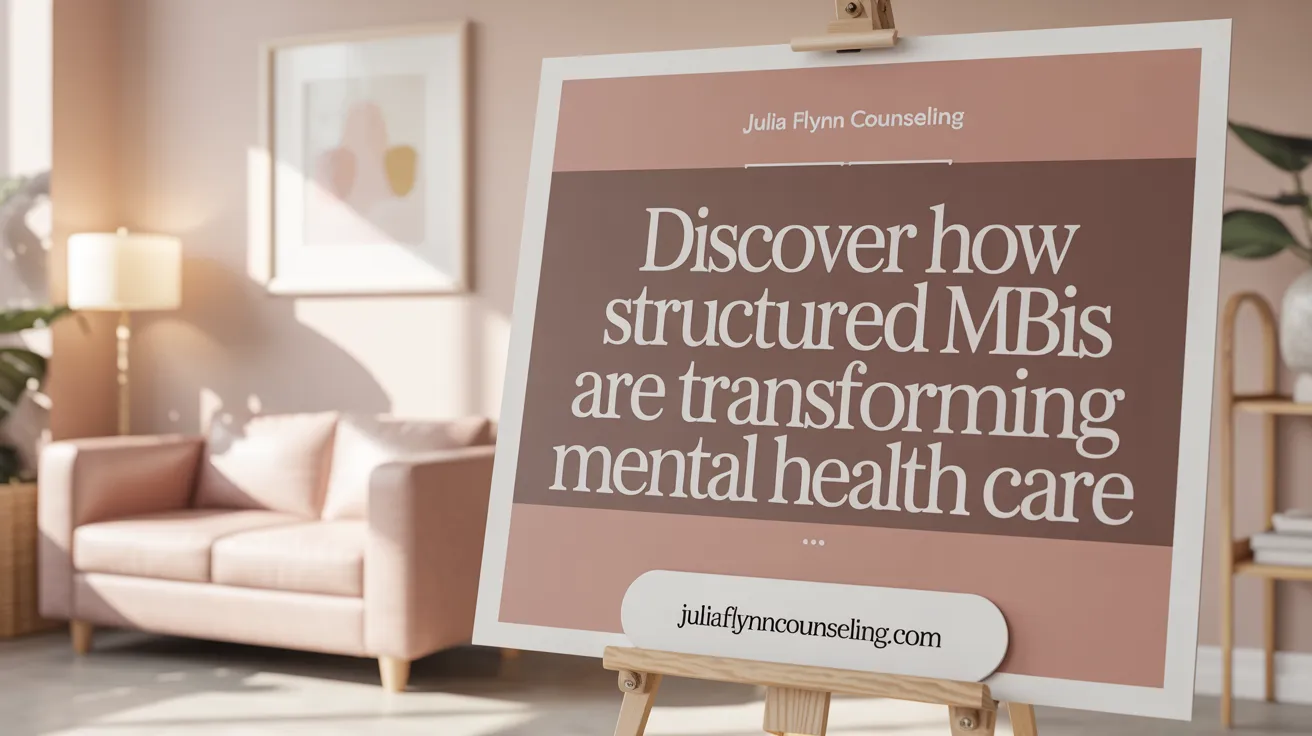
What Are Mindfulness-Based Interventions (MBIs)?
Mindfulness-Based Interventions (MBIs) are structured therapeutic programs that use mindfulness practices to help individuals manage mental health concerns. Key programs include Mindfulness-Based Stress Reduction (MBSR), Mindfulness-Based Cognitive Therapy (MBCT), and Dialectical Behavior Therapy (DBT). MBSR focuses on meditation, yoga, and body scanning over an eight-week course, aimed at reducing stress (Mindfulness-Based Stress Reduction (MBSR) program. MBCT combines cognitive therapy with mindfulness exercises to prevent depression relapse. DBT integrates mindfulness as a foundational skill to improve emotional regulation and interpersonal effectiveness (Mindfulness and emotional regulation).
How Effective Are MBIs for Anxiety, Depression, and Stress?
Extensive research shows that MBIs effectively reduce symptoms of anxiety, depression, and stress. Studies indicate that both MBSR and MBCT outperform non-evidence-based treatments and rival the efficacy of cognitive-behavioral therapy in symptom reduction. These interventions help individuals become less reactive to distressing thoughts and feelings, promoting a more reflective, nonjudgmental stance toward internal experiences (Mindfulness-Based Interventions for Anxiety and Depression.
What Role Does Mindfulness Play in Psychotherapy?
Mindfulness enhances psychotherapy by increasing self-awareness and emotional regulation. It teaches patients to observe their thoughts and emotions without judgment, breaking negative patterns and reducing emotional reactivity. Techniques like guided meditation, body scans, and mindful breathing are commonly used during therapy sessions to foster these skills (Mindfulness and Psychotherapy. Mindfulness supports acceptance and openness, critical for managing anxiety, depression, PTSD, and stress-related conditions.
How Does Therapist Mindfulness Benefit Treatment Outcomes?
Therapist mindfulness is linked to improved patient outcomes. Therapists who practice mindfulness tend to experience less burnout and heightened empathy, which enhances their therapeutic presence and effectiveness. This mindfulness practice allows clinicians to maintain clearer focus and emotional balance, facilitating stronger therapeutic alliances and better patient symptom reduction. Incorporating mindfulness into both therapy and therapist self-care benefits the overall treatment process (Therapist mindfulness benefits.
Mindfulness for Teens: Tailoring Practices to Adolescent Needs
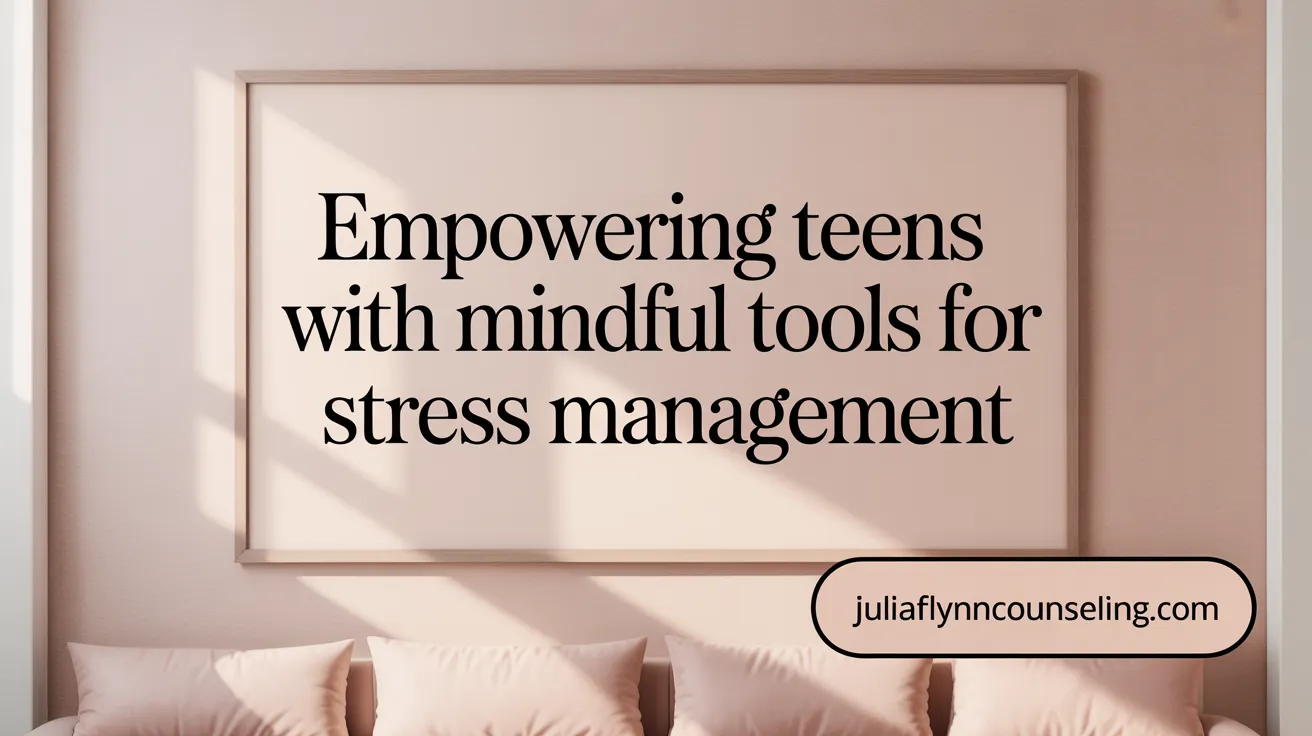
How Does Mindfulness Benefit Teens Facing Academic and Social Pressures?
Mindfulness helps teens manage the complex pressures of schoolwork, social situations, and personal identity exploration. By focusing attention on the present moment without judgment, mindfulness reduces stress and anxiety levels which are prevalent among adolescents. It also improves mindfulness and emotional regulation, allowing teens to better handle challenges. Enhanced attention control gained through mindfulness contributes to improved focus and decision-making abilities, supporting academic performance. For more on mindfulness activities for teens and managing academic pressure with mindfulness, see these resources.
What Mindfulness Exercises Are Suitable for Young People?
Simple, engaging practices work well for teens. These include mindful breathing exercises, guided meditation, and body scans to promote awareness of bodily sensations. Activities like mindful walking, gentle yoga, and mindful listening to music or nature can also be effective. Games such as the 'five senses scavenger hunt' help shift focus to the present moment in a playful way. Incorporating short mindful breaks during study sessions or daily routines supports stress relief and better concentration. Learn more about mindfulness exercises for teens and mindful breathing techniques.
How Can Apps and Digital Tools Support Teens in Mindfulness Practice?
Numerous apps designed for young users provide guided mindfulness exercises, making the practice accessible and enjoyable. Popular examples include Smiling Mind, Insight Timer, and MyLife Meditation. These apps offer features like reminders, progress tracking, and customized practice sessions that fit teen lifestyles. Utilizing digital resources encourages consistency and offers immediate support during stressful moments. Find more about mindfulness apps for teens and mindfulness for stress management.
What Strategies Can Parents and Educators Use to Support Teens?
Parents and teachers can foster mindfulness by modeling mindful behavior and creating quiet, distraction-free environments for practice. Encouraging open dialogue about mental health and normalizing mindfulness as a tool for well-being helps build acceptance. Establishing routines that incorporate mindful activities, such as breathing exercises before tests or group mindfulness sessions, promotes habit formation. Patience and positive reinforcement are vital as teens develop these new skills. For additional guidance on helping teens practice mindfulness for mental health see this resource.
The Neuroscience of Mindfulness: How It Changes the Brain
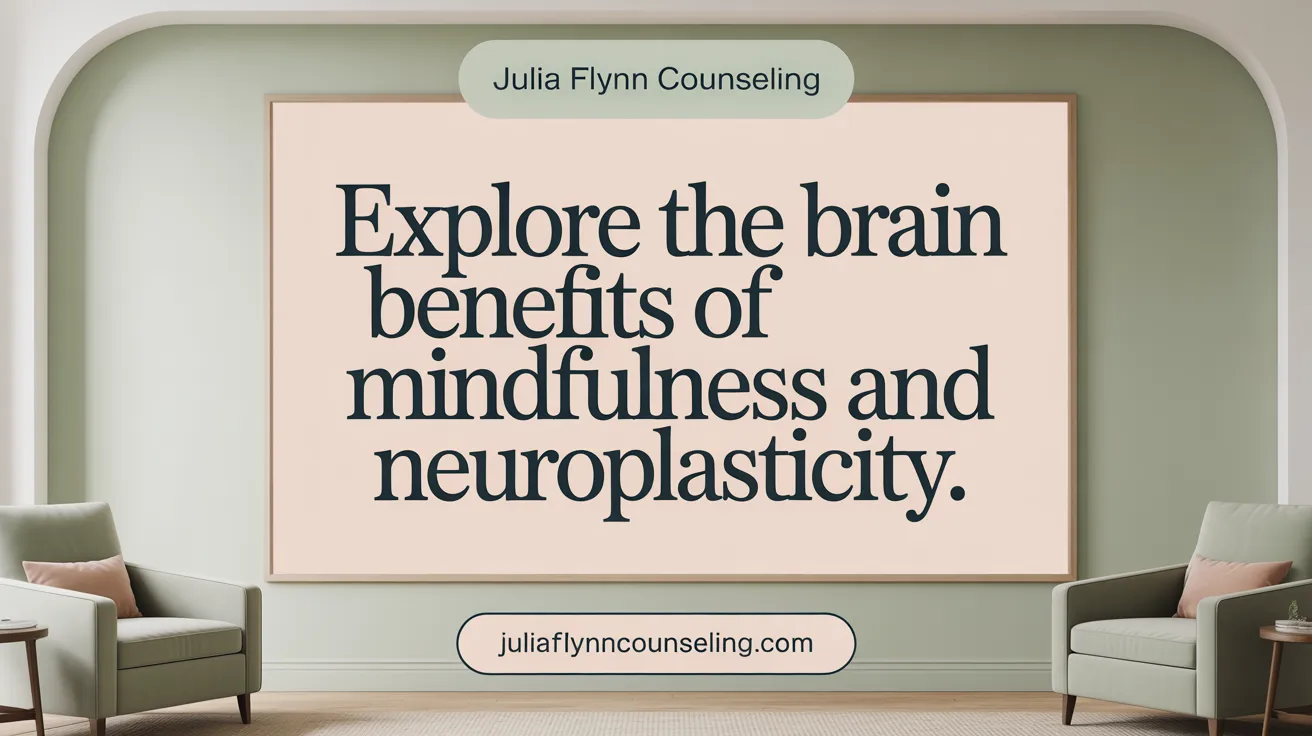
Brain Areas Influenced by Mindfulness
Mindfulness practice strengthens brain regions related to attention and emotional control. The prefrontal cortex, responsible for focus and decision-making, shows increased activity during Mindfulness meditation benefits. Meanwhile, the amygdala, the brain's center for emotional arousal and stress responses, often exhibits decreased activity, resulting in calmer emotional reactions.
Reduction of Cortisol and Stress Response
Regular mindfulness reduces cortisol levels, the hormone linked to stress. Lower cortisol production helps downregulate the body's stress response system, promoting relaxation and improving overall mental and physical health (Mindfulness-Based Interventions (MBIs) overview.
Neuroplasticity and Emotional Regulation Improvements
Mindfulness fosters neuroplasticity—the brain's ability to reorganize and form new neural connections. This plasticity enhances emotional regulation by increasing grey matter volume in regions associated with managing emotions and increasing self-awareness, which helps break negative thought patterns and reduces anxiety and depression symptoms (Benefits of Mindfulness).
Real-Time Brain Feedback and Precision Mental Health Approaches
Advances in neuroscience enable real-time visualization of brain activity, empowering individuals to learn to regulate their brain functions through mindfulness. Combining this with precision mental health care using brain scans and genetic information allows tailoring mindfulness-based therapies to individual needs, potentially improving outcomes especially in conditions like depression, anxiety, and other mental health disorders.
Building a Personalized Mindfulness Routine for Sustainable Mental Wellness
Starting Small and Consistent Practice
Building a mindfulness routine begins with small, manageable steps. Even brief daily sessions of 5 to 10 minutes can cultivate greater calmness, focus, and emotional resilience. Consistency matters more than length—practicing regularly helps develop mindfulness skills gradually, making it easier to stay present in daily life without feeling overwhelmed.
Morning and Evening Mindfulness Rituals
Establishing rituals at the start and end of the day can anchor mindfulness into your routine. Mornings might include mindful breathing or setting positive intentions, which can set a calm tone for the day. Evenings can feature gratitude journaling or reflective meditation to promote relaxation and self-awareness before sleep, enhancing emotional wellbeing and stress relief.
Incorporating Mindfulness Reminders and Tracking Progress
Using reminders during routine activities—like mindful breathing while washing dishes or mindful walking—helps maintain present-moment awareness throughout the day. Tracking progress by journaling experiences or using mindfulness apps supports motivation and self-compassion, allowing you to notice improvements and adjust practices for your needs.
Mindfulness as a Complement to Other Mental Health Treatments
Mindfulness can be effectively combined with therapies such as Cognitive Behavioral Therapy (CBT), Dialectical Behavior Therapy (DBT), or medication. It supports emotional regulation, reduces stress responses, and fosters self-awareness, enhancing the benefits of other treatments. Seeking guidance from mental health professionals can personalize mindfulness strategies, ensuring they complement your overall mental health plan.
Technology and Mindfulness: Using Tools to Support Your Practice
What mindfulness apps can support my daily practice?
Several apps like Calm, Headspace, and Smiling Mind provide accessible platforms for mindfulness practice. These apps offer guided meditations, calming music, and exercises tailored to different experience levels. Smiling Mind, for example, is well-suited for young people and beginners, while Calm and Headspace cater to adults looking for structured routines and relaxation techniques (Mindfulness apps for teens).
How do online courses and guided meditations enhance mindfulness?
Online courses deliver structured learning experiences that combine education and practice, helping users build skills steadily. Guided meditations within these courses or standalone sessions provide audio or video instructions that support focus and create a calming environment, making it easier to incorporate mindfulness into busy schedules (Mindfulness Meditation Practices).
What are the benefits and limitations of digital mindfulness resources?
Digital tools increase accessibility, allowing users to practice anytime and anywhere, accommodating various lifestyles. They often include reminders and tracking features that encourage consistency. However, some limitations arise such as potential over-reliance on technology, lack of personalization, and occasional distractions. Not all apps or courses are evidence-based, so selecting trusted sources is important (How to look after your mental health using mindfulness.
How can professional guidance bridge with self-practice using technology?
Combining self-guided digital approaches with professional support optimizes mindfulness benefits. Therapists and mindfulness coaches can recommend suitable apps or online materials tailored to individual needs, offer feedback, and address challenges. This integrated approach fosters accountability, deeper understanding, and sustained progress in mindfulness practice (Incorporating mindfulness into therapy).
Potential Challenges and Precautions When Practicing Mindfulness
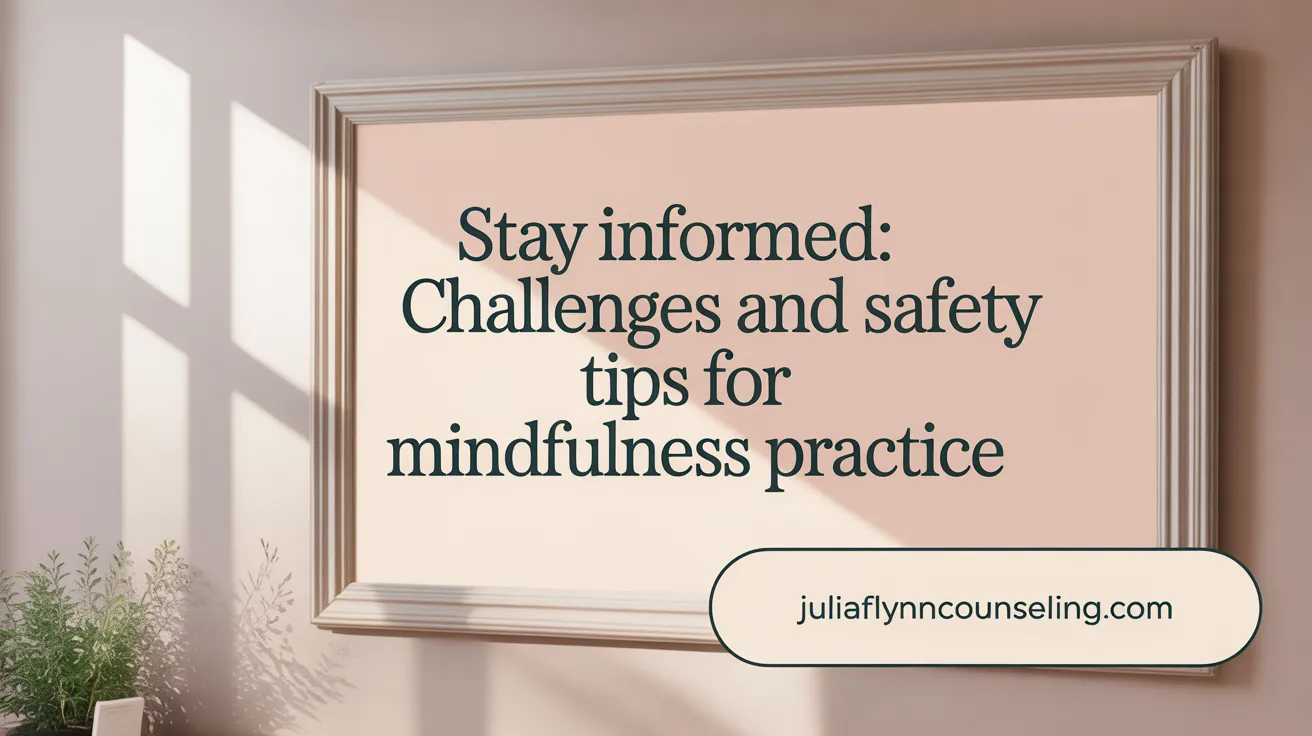
When Is Mindfulness Not Suitable?
Mindfulness is generally beneficial but may not be appropriate for everyone. Individuals who have experienced recent bereavement or are undergoing severe mental health crises, such as mania or suicidal thoughts, should approach mindfulness cautiously. In these cases, mindfulness may bring up intense emotions or trigger distressing memories (How to look after your mental health using mindfulness.
Managing Difficult Emotions During Practice
During mindfulness practice, some people might encounter challenging feelings or thoughts. It's important to recognize these experiences as part of the process and approach them with patience and self-compassion. Techniques such as guided meditation or body scans can help maintain non-judgmental awareness and provide a safe structure to handle emotional discomfort (Mindfulness-Based Interventions for Anxiety and Depression.
When to Seek Professional Support
If mindfulness practice brings up overwhelming emotions or worsens mental health symptoms, consulting a mental health professional is advised. Therapists trained in mindfulness-based interventions can offer personalized guidance and adapt practices to suit individual needs, ensuring safety and effectiveness (Mindful Health mental health care).
Adapting Mindfulness to Individual Needs
Mindfulness is flexible and can be tailored to accommodate varying circumstances. For example, shorter or modified exercises, gentle movement like mindful walking or yoga, and combining mindfulness with other therapeutic approaches can make practice more accessible while respecting personal boundaries and existing conditions (Incorporating mindfulness into daily routines.
Embracing Mindfulness for Lifelong Mental Health
The Benefits of Mindfulness
Mindfulness is the practice of paying focused, nonjudgmental attention to the present moment. It promotes emotional regulation, reduces stress, anxiety, and depression, and enhances overall mental and physical well-being. Research shows mindfulness can improve sleep quality, lower blood pressure, and support cognitive functions like memory and concentration. By fostering self-awareness and acceptance, mindfulness helps individuals break free from negative thought cycles and build resilience.
Practical Approaches to Mindfulness
Mindfulness can be integrated easily into daily life through simple practices such as mindful breathing, body scans, and mindful walking. Activities like mindful eating and gratitude journaling allow for present-moment awareness amid daily routines. Short, regular sessions—even just a few minutes—can lead to meaningful benefits over time. Tools like guided meditations, mindfulness apps, and professional support can assist in maintaining this practice.
A Lifelong Journey
Embracing mindfulness is not a one-time event but a continuous journey toward emotional balance and well-being. Small, intentional moments of mindfulness encourage patience, openness, and self-compassion. As mindfulness becomes part of everyday life, it cultivates a stronger ability to manage stress, improves relationships, and nurtures lasting mental health.
By welcoming mindfulness into your daily habits, you build the foundation for sustained emotional resilience and a healthier, more present life.
